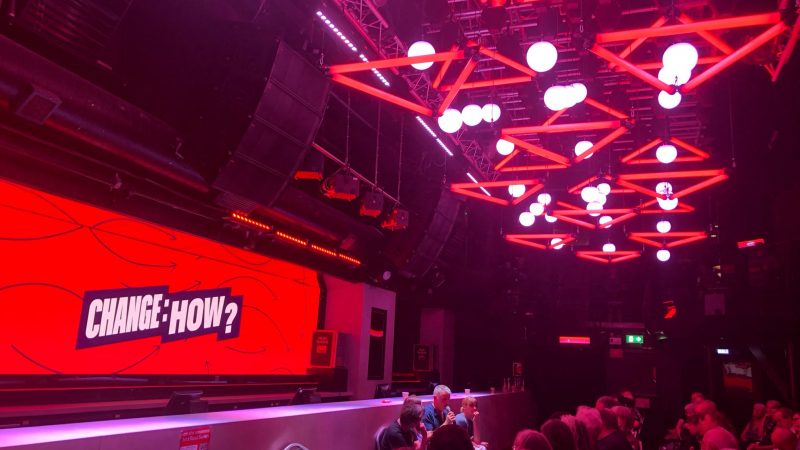
It has been a difficult few years for the soft left. But is the least factional of Labour’s factions now stirring?
Many on the soft left backed Keir Starmer’s leadership campaign, whether drawn by his Remainer profile, seeming mainstream appeal or initial ‘Corbynism-lite without Corbyn’ programme.
Starmer’s rightwards shift since may have helped secure Labour’s biggest landslide in decades, but some of the more contentious decisions along the way have alienated plenty of activists not just on the radical left – but the soft left too.
What’s notable though is how quiet, slow, disparate or cobbled together the immediate backlashes have sometimes been to many such controversial choices among swathes of Labour’s soft left – from ditching the £28 billion green pledge to slashing the aid budget.
As even two sympathetic observers of soft left Labour politics asked even before the election, “why, for all its intellectual richness, is the soft left apparently so unable to advocate and organise for its own politics?”
READ MORE: Lou Haigh: ‘We need change that spark fights – and a new economic settlement’
One decision epitomising the current party leadership’s willingness to sacrifice soft left support – in pursuit of electoral victory and the stifling of dissent – was threatening Neal Lawson with expulsion in 2023 over a year-old tweet.
Lawson, a one-time New Labour adviser, was and still is one of the most high-profile figures on the soft left, leading one of the few high-profile soft left campaign groups – Compass.
500 activists deep in the barrels of a nightclub
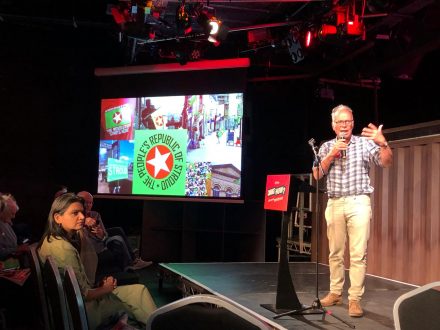 That context makes over 500 activists coming together on Saturday for a Compass conference a notable development in Labour’s internal political landscape.
That context makes over 500 activists coming together on Saturday for a Compass conference a notable development in Labour’s internal political landscape.
The event marks the biggest Compass conference not only since the general election, but in several years – albeit not all Compass members are Labour supporters (a pluralism that has earnt Lawson enemies on Labour’s right, and perhaps explains why stewards stopped checking names on the door to get attendees in quicker).
Large numbers of Labour members have departed the party in recent years; we recently revealed how bad the haemorrhaging has been, and the party is no longer even sharing data with its ruling body. If the number of grey hairs at this conference is anything to go by, that exodus has been disproportionately young.
Yet the many activists here, members or not, clearly remain optimistic and confident enough there is still space for more radical political change under Labour, even if it feels far off for now amid so many “difficult decisions”, or likely to take significant mobilisation.
That was part of the point of this conference, basking in the unlikely glow of neon red lights and disco balls in the dark, windowless barrels of the Ministry of Sound while the sun shone outside. They were here not to party but share ideas, tactics and inspiration over free coffee and biscuits under the event’s strapline: “Change: How?”.
A telling sign of the audience’s politics came when the first spontaneous, mid-speech clapping of the day erupted during Neal Lawson’s introduction.
Lawson noted that a past LabourList poll of party supporters had found Ed Miliband was members’ favourite cabinet member, and Greater Manchester mayor Andy Burnham had been the most popular choice to be the next Labour leader. Cue applause when he mentioned the second.
Burnham himself called it the “right event at the right time” in his speech, the final one of the event.
The first unofficial hustings of a soft left leadership contest?
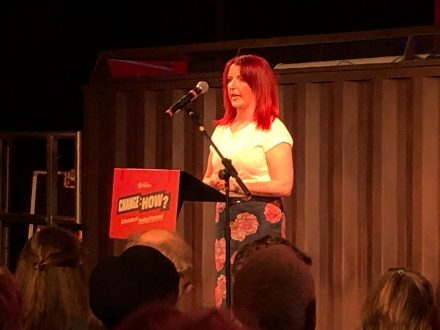
The number of Labour politicians speaking at the event felt significant too – both as a rare public coalescing of this amorphous part of the party, and as food for thought about who might carry the torch in future leadership elections. Was this the first, unofficial hustings of the soft left’s internal contest?
Not only Burnham himself, but also other big Labour names appeared. Louise Haigh was the first major speaker of the day after Lawson, having notably chosen this event to make one of her biggest interventions yet in political debate since leaving the cabinet last year (itself yet another sign of the long squeezing out of the soft left). It was her first major public speech outside Parliament since her unceremonious return to the backbenches last November.
But there were other national politicians too. A video message was screened from MP and Compass veteran Clive Lewis, a former leadership contender and one of the most vocal backbench critics of this government to date, apologising for his absence. He said was away camping with his daughter – and with one-time Compass Youth chair and former MP Sam Tarry.
Not all the MPs were the same familiar faces from every Compass event past, however. There in person as well were the new MPs Miatta Fahnbulleh from Peckham, here for a keynote speech and notably the only government minister present, plus Patrick Hurley from Southport and Simon Opher from Stroud.
Compass enthusiast Lisa Nandy and Angela Rayner would surely have been here as well if it wouldn’t naturally spark the steepest of raised eyebrows at the best of times as cabinet members – even without a spending review ongoing and speculation of reshuffles and leadership manoevres.
Two longer-standing Labour rebels, Nadia Whittome and Rachael Maskell, spoke on panels too – as well as two former cabinet members from the New Labour era, John Denham and Clare Short. Jovan Owusu-Nepaul, Labour’s candidate against Farage last year, was another speaker.
The start of Burnham’s programme for government?
Some of the big names did not mince their words, united in a push for Labour to look left – or at least take a chance on a few ideas from the left. Between them it all added up to a fairly lengthy policy platform.
READ MORE: Burnham issues a radical rallying cry
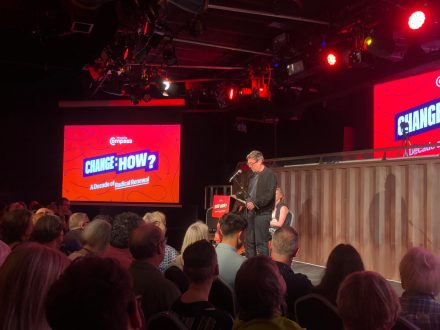
Most here were probably centrist enough to agree with Denham’s dismissal of the kind of Bennite ‘Alternative Economic Strategy’ he admitted supporting as a young man – his suggestion it’s “not feasible” certainly didn’t prompt jeers. Nor did his suggestion that the state could sometimes be “oppressive, paternalistic, bureaucratic”, and its role should be to mitigate the problems of the market (with the unsaid add-on ‘rather than nationalise the solar system’, perhaps).
But many here would probably also agree with the package of measures he explicitly said should form part of a soft left programme. He said a better minimum wage and workplace rights should be far more central to Labour’s public narrative, and rail nationalisation should be “described as a building block of securonomics”.
Denham added that Labour should be tougher on water industry asset-stripping and insufficient regulator action (albeit Steve Reed would argue he is), “tell tech bros partnership does not mean giving away personal data and creativity or allowing them to pollute our grandchildren’s phones”, and link planning reform to “action on cartels so we get the homes we need”
Andy Burnham set out the longest wishlist and secured the loudest cheers during an impassioned speech, ranging conspicuously beyond his mayoral realm some 200-odd miles north of this south London nightclub.
Backing not only a wealth tax but proportional representation, and decrying “factionalism…on all sides”, he had the audience of pluralist Compassites in the palm of his hand.
In the speech and subsequent interviews, he threw in record social housebuilding too and free transport for teenagers – plus some serious shade on his comrades in government, slating winter fuel cuts, disability benefit cuts, the two-child cap, and – in a seemingly new, thinly veiled attack – any “aping” of the rhetoric of the far-right.
Would Haigh ever run for the leadership?
The New Statesman reported that Burnham had “made his leadership pitch”, though cynical observers would say that started long ago or perhaps never stopped (albeit Burnham did say he fully supports Starmer).
The more interesting question is whether Louise Haigh, Clive Lewis or even new MP Miatta Fahnbulleh were sowing the seeds for future leadership bids too. Does the timing just coincidentally reflect Compass’ long-held plans and The Telegraph‘s political whims, or has whoever leaked the paper Rayner’s memo less than a fortnight ago just fired the starting gun on a wider soft left leadership contest?
Subscribe here to our daily newsletter roundup of all things Labour – and follow us on Bluesky, WhatsApp, Threads, X or Facebook.
“We’ve had New Labour and Blue Labour. Now it’s time for Lou Labour,” Compass chair Neal Lawson smiled as he introduced her. Haigh defended her transport legacy but ranged well beyond it, calling for a “new economic settlement” and warning Labour must be prepared to choose change that “sparks fights”.
In a sign there is absolutely no love lost between Haigh and the high-ups who outed her, she said Labour’s response to the local elections cannot just be “caution” and “doubling down on unpopular decisions”. She urged the Chancellor to “rip up our self-imposed tax rules – and deliver a proper wealth tax”. The next election will be a “vote for who is capable of delivering radical change”.
Meanwhile Clive Lewis went furthest condemning the government, accusing it of effectively ‘rolling out the red carpet for an authoritarian Nigel Farage government” and not appearing to “possess the Labour values as we understand it here at Compass”.
Dr Fahnbulleh’s prescription for a ‘new economic model’
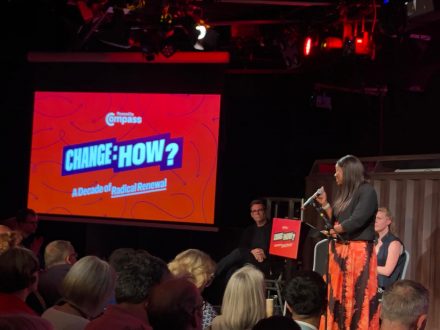 Fahnbulleh naturally reeled off the government’s achievements most, as a minister under Miliband’s wing in the Department for Energy Security and Net Zero. But there were eye-catchingly broad brush strokes in her speech, and seeming hints if not explicit calls for Labour to be bolder over the coming decade.
Fahnbulleh naturally reeled off the government’s achievements most, as a minister under Miliband’s wing in the Department for Energy Security and Net Zero. But there were eye-catchingly broad brush strokes in her speech, and seeming hints if not explicit calls for Labour to be bolder over the coming decade.
“Because things have been so broken, we need to lift our sights, not lower our sights….to fundamentally renew the country. How do we get the economy to work for the majority of people, not just a few? This is the question that the progressive left must answer if we are to get to the heart of the frustration that you can feel in the country.
“We have to confront the reality that the economic model we all subscribed to for decades is failing. The idea that if you grow the economy by giving your wealth creators the edge..everyone is better off,” she said to applause. ”
She added: “To deliver radical renewal, at the heart of this must be the pursuit of a new economic model…that gives people control, power and a stake in the economy….[we need] a concerted drive to push up living standards as part of a new social settlement….[and] a radical devolution of power.”
Will Labour whips be intensely relaxed about that kind of ministerial blue-sky thinking? Would Rayner or Nandy have got away with it? Will those who read all Westminster politics as a power play see it as positioning for a leadership bid, if only to build profile for the next contest after that?
The cabinet heavyweight or the prince/ss across the water?
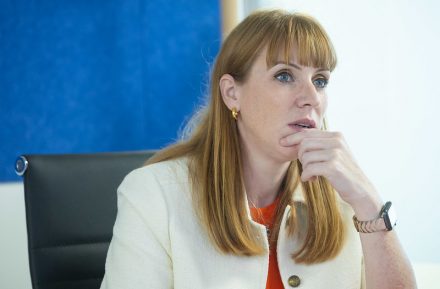
The fact Rayner and Nandy weren’t there at all illustrates an interesting part of soft left activists’ choice whenever the next leadership election does roll round. It’s not only a question of particular individuals, but of particular kinds of leader, if any of the following were indeed to stand.
Assuming they don’t want a continuity candidate (whoever the Starmerism without Starmer candidate might be), will they want what members of all parties often go for – the cabinet ‘big beasts’ with the profile and experience, like Rayner or Nandy? Or could both of their collective responsibility to defend the government’s hard choices (rather than spell out alternatives at events like this), and Nandy’s past defeat, dent some of their likely wide appeal to this part of the party?
Might at least a small number on the more radical end of the soft left plump for a lesser-known, fresher face, much as Corbyn swept in – whether on the outside (someone like Lewis or Whittome) or inside (someone like Fahnbulleh)? Or would they be hamstrung by lower name recognition, or the bitter taste of defeat under Corbyn and Miliband?
READ MORE: The little-noticed ‘Burnham’ rule of conference 2024
The likely option for many is of course the exiled prince or princess across the water, sometimes the leading lights relegated to the backbenches, where the grass can look greener. Think Boris Johnson, once literally over the water too in City Hall, but perhaps Haigh. But sometimes you find them less poetically up the West Coast Main Line.
But would Haigh’s exposed conviction hamper her bid, and would (rarely soft left) party apparatchniks’ control of selections and a tweak to Labour rules last year, stopping politicians double-jobbing, make it fiendishly difficult for Burnham to actually return to Westminster?
It’s not for nothing one wag once called it the “Burnham rule”. Might we look back and find the most quietly handled decisions in September 2024, by Labour’s most unassumingly titled committee, the conference arrangements committee, killed off Burnham’s third leadership bid before it was born?
- SHARE: If you have anything to share that we should be looking into or publishing about this story – or any other topic involving Labour– contact us (strictly anonymously if you wish) at [email protected].
- SUBSCRIBE: Sign up to LabourList’s morning email here for the best briefing on everything Labour, every weekday morning.
- DONATE: If you value our work, please chip in a few pounds a week and become one of our supporters, helping sustain and expand our coverage.
- PARTNER: If you or your organisation might be interested in partnering with us on sponsored events or projects, email [email protected].
- ADVERTISE: If your organisation would like to advertise or run sponsored pieces on LabourList‘s daily newsletter or website, contact our exclusive ad partners Total Politics at [email protected].




More from LabourList
‘Council Tax shouldn’t punish those who have the least or those we owe the most’
Two-thirds of Labour members say government has made too many policy U-turns, poll reveals
‘Two states, one future: five steps on the path to peace for Israelis and Palestinians’